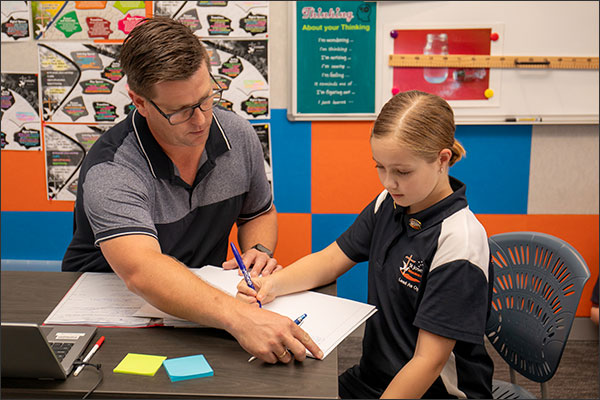
© Brisbane Catholic Education, St Joseph's Catholic Primary School (2024)
St Joseph's School is a sacred place where faith, culture and life are in dialogue and where learners are empowered to shape and enrich their world with meaning, purpose and hope derived from their encounter with life and the teachings of Jesus.
In this context, approaches to curriculum and pedagogy which are deeply rooted in faith, empowers students with the essential knowledge, skills and capacities and capabilities to 'become confident and creative individuals, successful lifelong learners, and active and informed members of the community' (Mparntwe Declaration). The Australian Curriculum provides our school with the content and in return the school focuses on how it will be implemented so that learning and teaching supports, enables and engages the learner in the contemporary world with a commitment to each of the following and informed from our Vision for Learning:
Learning Opportunities:
Rigorous and relevant
Rich in assessment: for, of, and as learning
Personalised
Explicit and scaffolded Equitable
| Developing deep understandings about self, others and the world:
Exploring multiple perspectives Considering religious, social, cultural, historical, political and ethical influences Experiencing, analysing, conceptualising, applying.
| Contemporary Literacies that involve:
Developing culturally relevant and valued literate practices Creating and interacting with print, and multimodal texts
Engaging critically and effectively in a multi-modal world
Communicating appropriately in a range of social contexts.
| Learning Environments:
Connected to local and global networks
Collaborative
Secure and safe Flexible
Supportive of innovation Inquiry focussed
| Contributing to Community through:
Taking responsibility for self Taking action that matters Committing to service and justice
Developing partnerships
Active citizenship
| Core knowledge, skills and understanding developed:
Reflection and planning Thinking creatively
Communicating and collaborating
Exploring, experimenting and creating new knowledge | Building Relationships through:
Connecting and learning with others within and beyond the classroom over time and space.
|
All phases of schooling are informed through Brisbane Catholic Education's Learning Framework; Strategic Renewal Framework; Religion Curriculum; Queensland Studies Authority publications; the Australian Curriculum and government regulatory compliance requirements.
The Religion Curriculum P-12 and materials are the source for all planning of Religious Education in Brisbane Catholic Education Schools.
The Australian Curriculum will be the source of all curriculum planning, assessment and reporting for all Learning Areas covered by the Australian Curriculum. Key Learning Areas not covered by the Australian Curriculum will be sourced from the relevant state statutory body. The Mparntwe Declaration outlines two goals similar to the 2008 Melbourne Declaration: The Australian education system promotes excellence and equity. All young Australians become confident and creative individuals, successful lifelong learners, and active and informed members of the community. |